Pete Sutton's Blog, page 40
October 20, 2014
Interview with Jacey Bedford
Jacey dropped in to the blog to talk about her writing -
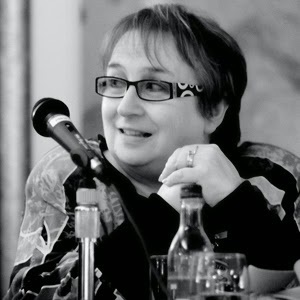
Jacey Bedford lives behind a desk in Pennine Yorkshire. She's been a librarian, a postmistress and (for 20 years) a singer with internationally touring a cappella trio, Artisan. She's had short stories published on both sides of the Atlantic in anthologies and magazines before getting a book deal with DAW in the USA for three novels. She's one of the organisers of the annual Milford SF Writers' Conference and the Northwrite SF writers group.
She's a fairly recent convert to conventions, though this year has been busy with Eastercon, Worldcon in London and Fantasycon in York. She'll be at Bristolcon for the first time in October and returning to Novacon in Nottingham in November.
For anyone that hasn’t read them can you tell us a bit about your books
I write both science fiction and fantasy and have a three book deal with DAW in the USA. My first book, Empire of Dust is a star-spanning space opera about trust and betrayal. It's published in November 2014 and will be followed by Crossways in 2015.
Tell us a bit more about the last book you wrote
I'm currently in the process of writing Crossways, the sequel to Empire of Dust. As is often the way of things in publishing, books aren't always released in the order you write them. Empire of Dust has been written and rewritten a number of times. Empire (and Crossways) feature psi-techs, humans implanted with telepath technology. They are creations of the megacorporations and their enhanced skills in navigation, engineering and communication are at the heart of the megacorps success, but the psi-techs pay a high price. They are indentured to the megacorps, looked after only as long as they toe the line. I've written about what happens when some of them face a moral choice that puts them on the wrong side of the megacorps and the law.
Cara Carlinni is on the run after uncovering corruption. Alphacorp can find their implant-augmented telepaths, anywhere, anytime, mind-to-mind, so even though it's driving her half-crazy she's powered down and has been surviving on tranqs and willpower. So far, so good. It’s been almost a year, and her mind is still her own even though she’s stuck on a backwater space station. At least she’s got a breathing space, or has she? When an Alphacorp ship docks, looking for her, Cara hitches a ride out with Ben Benjamin, a psi-tech Navigator. He may be a bit of a stuffed shirt, but at least he’s not actively trying to kill her, and since The Trust is Alphacorp’s biggest rival, she’ll take a chance.
Ben's not as straight-laced as he looks. He’s got a stubborn streak and he’s not afraid to bend rules and put the spirit of the law above the letter. Right now his career is teetering after losing a colony, and most of his team, to a fleet of raiders. He suspects boardroom betrayal, but has no proof. Cara and Ben are about to find themselves caught in a star-spanning manhunt, and if their enemies track them down, an entire colony planet could pay the ultimate price.
What did you learn about writing whilst writing the last book you wrote? To trust my instincts. I cut one of my earlier versions severely to please my (then) agent. Luckily I kept the old version because my current editor asked me to expand on this and deepen that - and most of what she asked for had been in that earlier pre-cut version.
Do you have a set writing process, if so what is it? I'm half pantser and half plotter, that is I start out writing by the seat of my pants, writing to discover more about the characters and what's happening to them. I generally have an idea of what the end will be - but at that point it's very vague. Four or five chapters in, with maybe twenty or thirty thousand words written, I sit down and try and take control of the plot before it gets out of hand. It sometimes means I end up rewriting the beginning, sometimes not. I don't plot in great detail, however, otherwise when I'm writing it I get a sense that I've already done it once. New ideas will always come into play and then I have to build them in or alter things as I go along. I'm a burst writer. I have done as many as ten thousand words in a day, but I can't keep up that pace for long. Like many other writers I fit my writing in around the demands of a day job, but luckily I'm self-employed (a music booking agent for folk musicians) so I can schedule my day to suit myself. I'm also an owl. I often work late into the night, but I'm pretty useless in the mornings.
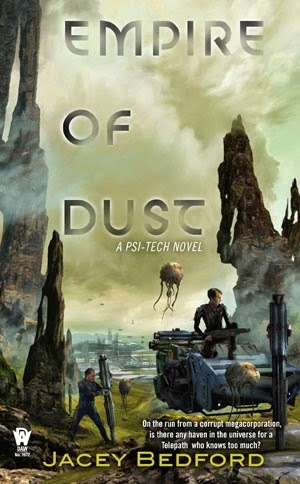
Do you write a lot of short stories? Not really, no. I'd written three full novels before I wrote and sold my first short story. Novel writing and short story writing are very different. Both need discipline, but if anything, short stories need greater discipline to bring in a complete story with a beginning, middle and end in just a few thousand words. I always want to introduce too many characters and layer in a few sub-plots and you can't do that in a short story. I've probably only written about thirty or forty short stories and sold about fifteen of them.
Do you prefer the long or short form? How do you feel about Flash Fiction? I prefer long form, but if I'm writing short stories I actually like flash. I didn't used to be able to write a short story in under 7500 words, but I'm getting better at being more concise. I sold a 950 word short story to Nature Magazine a couple of years ago, The Loneliness of the Long Distance Panda, and it's resold and been reprinted a few times. It's in the Futures 2 anthology, coming out at Buzzymag.com next year and has been translated into Galician for the Spanish magazine, Nova Fantasia, where it's A Soidade do Panda de Longa Distáncia. How cool is that? Which character in your books do you most identify with and why? I don't know that I identify with any of the main characters from my books. They are very different from me, but each has traits that I can understand: Ben's sense of justice and his determination to do the best he can for the people who are relying on him; Cara's deep desire to find a safe place; Crowder's dedication to the Trust, Lorient's imperative not to compromise his own principles. I suppose the character who's most like me is Wenna, a supporting character who likes to organize things. You wouldn't know it from my desk, but I am an organizer even if, like Wenna, I don't have a prosthetic arm and do my job in space.
Which bit of your writing are you most proud of? I'm proud of being published in general. It's been a long-term ambition and at last I've achieved it. I'm not sure I could pick out one bit above the rest, though I did very much enjoy writing the twisty plot-related relationship between Ben, Cara and Ari van Blaiden, one of the book's bad guys whose presence drives a lot of the plot even though he's hardly on the page until the end.
Tell us a bit about how you got published? Did you go via a slush pile? Get an agent before a publisher? I had two agents who came and went before I got my deal by sending another novel, Winterwood, to DAW's slush pile myself. DAW's slush pile is huge and the editors' time is very limited, so I was lucky to have a personal introduction from the very talented Kari Sperring whose two books, Living With Ghosts and The Grass King's Concubine, are both published by DAW. Sheila Gilbert, my editor, made me an offer for Winterwood and then asked what else I had. After reading Empire of Dust she decided that we'd start with that one as she had an opening in her publication schedule for science fiction in November 2014. If we'd gone with Winterwood first it would likely not have come out until spring 2015. At the time I got the publisher's offer I was between agents, but I'd started sending out queries to get a new agent. I'd had some responses and been asked for full manuscripts by some agents but it was still early days. When I got my offer from DAW I emailed my top ten agent picks and asked that if they were interested they got back to me straight away because I would need them to deal with the offer that was already on the table. Unsurprisingly I got a lot of interest and, after long phone conversations, six offers of representation. They were all good, sound offers, but two were particularly attractive. In the end I went with Amy Boggs of the Donald Maass Literary Agency in New York. Amy is a young agent, enthusiastic, personable, and she has the might and experience of DMLA behind her, an agency which originated as a specialist agency for science fiction and fantasy.
In one sentence what is your best piece of advice for new writers? I can honestly say that without the lessons learned and the contacts made at Milford SF Writers' Conference I wouldn't be published now, so seek effective critique from fellow writers and learn from it. Many thanks to Jacey for her interesting answers!

Jacey Bedford lives behind a desk in Pennine Yorkshire. She's been a librarian, a postmistress and (for 20 years) a singer with internationally touring a cappella trio, Artisan. She's had short stories published on both sides of the Atlantic in anthologies and magazines before getting a book deal with DAW in the USA for three novels. She's one of the organisers of the annual Milford SF Writers' Conference and the Northwrite SF writers group.
She's a fairly recent convert to conventions, though this year has been busy with Eastercon, Worldcon in London and Fantasycon in York. She'll be at Bristolcon for the first time in October and returning to Novacon in Nottingham in November.
For anyone that hasn’t read them can you tell us a bit about your books
I write both science fiction and fantasy and have a three book deal with DAW in the USA. My first book, Empire of Dust is a star-spanning space opera about trust and betrayal. It's published in November 2014 and will be followed by Crossways in 2015.
Tell us a bit more about the last book you wrote
I'm currently in the process of writing Crossways, the sequel to Empire of Dust. As is often the way of things in publishing, books aren't always released in the order you write them. Empire of Dust has been written and rewritten a number of times. Empire (and Crossways) feature psi-techs, humans implanted with telepath technology. They are creations of the megacorporations and their enhanced skills in navigation, engineering and communication are at the heart of the megacorps success, but the psi-techs pay a high price. They are indentured to the megacorps, looked after only as long as they toe the line. I've written about what happens when some of them face a moral choice that puts them on the wrong side of the megacorps and the law.
Cara Carlinni is on the run after uncovering corruption. Alphacorp can find their implant-augmented telepaths, anywhere, anytime, mind-to-mind, so even though it's driving her half-crazy she's powered down and has been surviving on tranqs and willpower. So far, so good. It’s been almost a year, and her mind is still her own even though she’s stuck on a backwater space station. At least she’s got a breathing space, or has she? When an Alphacorp ship docks, looking for her, Cara hitches a ride out with Ben Benjamin, a psi-tech Navigator. He may be a bit of a stuffed shirt, but at least he’s not actively trying to kill her, and since The Trust is Alphacorp’s biggest rival, she’ll take a chance.
Ben's not as straight-laced as he looks. He’s got a stubborn streak and he’s not afraid to bend rules and put the spirit of the law above the letter. Right now his career is teetering after losing a colony, and most of his team, to a fleet of raiders. He suspects boardroom betrayal, but has no proof. Cara and Ben are about to find themselves caught in a star-spanning manhunt, and if their enemies track them down, an entire colony planet could pay the ultimate price.
What did you learn about writing whilst writing the last book you wrote? To trust my instincts. I cut one of my earlier versions severely to please my (then) agent. Luckily I kept the old version because my current editor asked me to expand on this and deepen that - and most of what she asked for had been in that earlier pre-cut version.
Do you have a set writing process, if so what is it? I'm half pantser and half plotter, that is I start out writing by the seat of my pants, writing to discover more about the characters and what's happening to them. I generally have an idea of what the end will be - but at that point it's very vague. Four or five chapters in, with maybe twenty or thirty thousand words written, I sit down and try and take control of the plot before it gets out of hand. It sometimes means I end up rewriting the beginning, sometimes not. I don't plot in great detail, however, otherwise when I'm writing it I get a sense that I've already done it once. New ideas will always come into play and then I have to build them in or alter things as I go along. I'm a burst writer. I have done as many as ten thousand words in a day, but I can't keep up that pace for long. Like many other writers I fit my writing in around the demands of a day job, but luckily I'm self-employed (a music booking agent for folk musicians) so I can schedule my day to suit myself. I'm also an owl. I often work late into the night, but I'm pretty useless in the mornings.

Do you write a lot of short stories? Not really, no. I'd written three full novels before I wrote and sold my first short story. Novel writing and short story writing are very different. Both need discipline, but if anything, short stories need greater discipline to bring in a complete story with a beginning, middle and end in just a few thousand words. I always want to introduce too many characters and layer in a few sub-plots and you can't do that in a short story. I've probably only written about thirty or forty short stories and sold about fifteen of them.
Do you prefer the long or short form? How do you feel about Flash Fiction? I prefer long form, but if I'm writing short stories I actually like flash. I didn't used to be able to write a short story in under 7500 words, but I'm getting better at being more concise. I sold a 950 word short story to Nature Magazine a couple of years ago, The Loneliness of the Long Distance Panda, and it's resold and been reprinted a few times. It's in the Futures 2 anthology, coming out at Buzzymag.com next year and has been translated into Galician for the Spanish magazine, Nova Fantasia, where it's A Soidade do Panda de Longa Distáncia. How cool is that? Which character in your books do you most identify with and why? I don't know that I identify with any of the main characters from my books. They are very different from me, but each has traits that I can understand: Ben's sense of justice and his determination to do the best he can for the people who are relying on him; Cara's deep desire to find a safe place; Crowder's dedication to the Trust, Lorient's imperative not to compromise his own principles. I suppose the character who's most like me is Wenna, a supporting character who likes to organize things. You wouldn't know it from my desk, but I am an organizer even if, like Wenna, I don't have a prosthetic arm and do my job in space.
Which bit of your writing are you most proud of? I'm proud of being published in general. It's been a long-term ambition and at last I've achieved it. I'm not sure I could pick out one bit above the rest, though I did very much enjoy writing the twisty plot-related relationship between Ben, Cara and Ari van Blaiden, one of the book's bad guys whose presence drives a lot of the plot even though he's hardly on the page until the end.
Tell us a bit about how you got published? Did you go via a slush pile? Get an agent before a publisher? I had two agents who came and went before I got my deal by sending another novel, Winterwood, to DAW's slush pile myself. DAW's slush pile is huge and the editors' time is very limited, so I was lucky to have a personal introduction from the very talented Kari Sperring whose two books, Living With Ghosts and The Grass King's Concubine, are both published by DAW. Sheila Gilbert, my editor, made me an offer for Winterwood and then asked what else I had. After reading Empire of Dust she decided that we'd start with that one as she had an opening in her publication schedule for science fiction in November 2014. If we'd gone with Winterwood first it would likely not have come out until spring 2015. At the time I got the publisher's offer I was between agents, but I'd started sending out queries to get a new agent. I'd had some responses and been asked for full manuscripts by some agents but it was still early days. When I got my offer from DAW I emailed my top ten agent picks and asked that if they were interested they got back to me straight away because I would need them to deal with the offer that was already on the table. Unsurprisingly I got a lot of interest and, after long phone conversations, six offers of representation. They were all good, sound offers, but two were particularly attractive. In the end I went with Amy Boggs of the Donald Maass Literary Agency in New York. Amy is a young agent, enthusiastic, personable, and she has the might and experience of DMLA behind her, an agency which originated as a specialist agency for science fiction and fantasy.
In one sentence what is your best piece of advice for new writers? I can honestly say that without the lessons learned and the contacts made at Milford SF Writers' Conference I wouldn't be published now, so seek effective critique from fellow writers and learn from it. Many thanks to Jacey for her interesting answers!
Published on October 20, 2014 01:00
October 13, 2014
Literary festivities
So the weekend just past was the cut down, compact & bijou Bristol Festival of Literature 2014
http://unputdownable.org/
@Bristollitfest
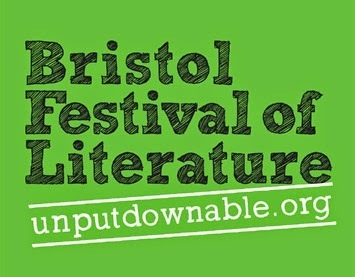
We did some things in association with Yardstick:
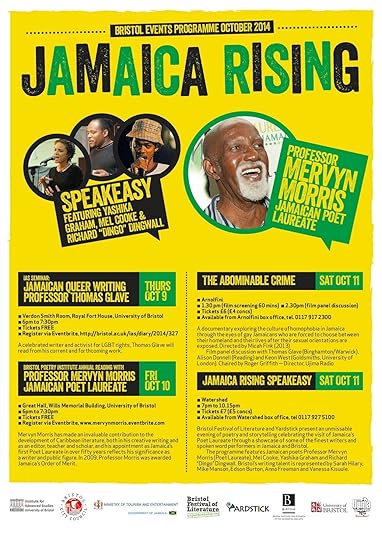 First up, for me, was a visit to the RWA where there was music & dance, poetry and art -
First up, for me, was a visit to the RWA where there was music & dance, poetry and art -

There was more poetry later on Friday but I missed it.
On Saturday I was at Foyles for the Southville Writers Books are my Bag event

Which had a very full, varied & interesting program of poetry, flash, short stories and workshops. Well done to the organisers for an enjoyable few hours rubbing shoulders with other Bristol writerly types.
Then Saturday night was the BFL Speakeasy Featuring Jamaican poets Mervyn Morris (Poet Laureate), Mel Cooke, Yashika Graham and Richard “Dingo” Dingwall. Bristol’s writing talent was represented by Milo Chambers, Sarah Hilary, Mike Manson, Anna Freeman and Vanessa Kisuule.

Which went really well and gave each of the visiting Jamaican poets a really good slot to showcase their poetry.My favourite performer of the night though was Ann Freeman who eschewed reading from her novel and regaled us with some of her own poetry instead.
Finally I picked up 50 goodie bags from Forbidden Planet for Super Comic Sunday
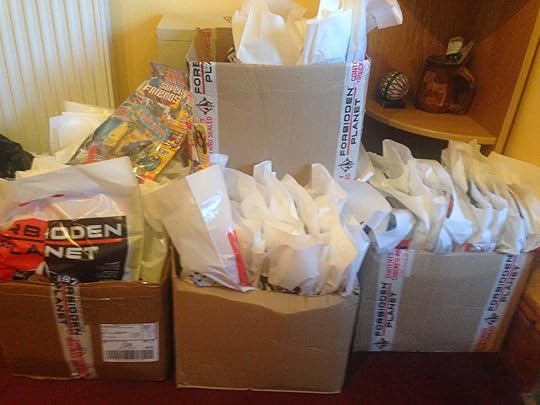
This was ably hosted by Cavan Scott, Huw Powell and Ian Millstead and we filled the top of the MShed with a host of happy families.
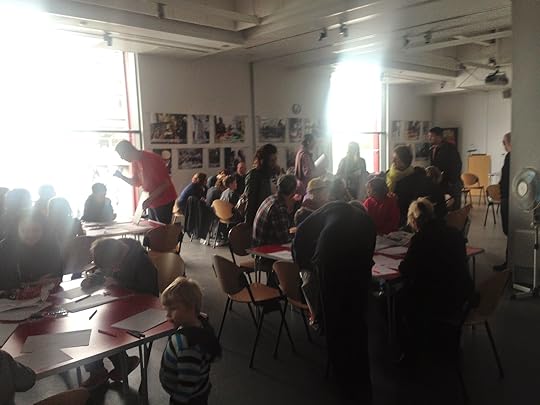

 Where the kids got to create a crazy comic characrer, learn how to be a space pirate and meet a bunch of comics creators.
Where the kids got to create a crazy comic characrer, learn how to be a space pirate and meet a bunch of comics creators.

One of the crazy characters. Great fun was had by all.
http://unputdownable.org/
@Bristollitfest

We did some things in association with Yardstick:
 First up, for me, was a visit to the RWA where there was music & dance, poetry and art -
First up, for me, was a visit to the RWA where there was music & dance, poetry and art -
There was more poetry later on Friday but I missed it.
On Saturday I was at Foyles for the Southville Writers Books are my Bag event

Which had a very full, varied & interesting program of poetry, flash, short stories and workshops. Well done to the organisers for an enjoyable few hours rubbing shoulders with other Bristol writerly types.
Then Saturday night was the BFL Speakeasy Featuring Jamaican poets Mervyn Morris (Poet Laureate), Mel Cooke, Yashika Graham and Richard “Dingo” Dingwall. Bristol’s writing talent was represented by Milo Chambers, Sarah Hilary, Mike Manson, Anna Freeman and Vanessa Kisuule.

Which went really well and gave each of the visiting Jamaican poets a really good slot to showcase their poetry.My favourite performer of the night though was Ann Freeman who eschewed reading from her novel and regaled us with some of her own poetry instead.
Finally I picked up 50 goodie bags from Forbidden Planet for Super Comic Sunday

This was ably hosted by Cavan Scott, Huw Powell and Ian Millstead and we filled the top of the MShed with a host of happy families.


 Where the kids got to create a crazy comic characrer, learn how to be a space pirate and meet a bunch of comics creators.
Where the kids got to create a crazy comic characrer, learn how to be a space pirate and meet a bunch of comics creators. 
One of the crazy characters. Great fun was had by all.
Published on October 13, 2014 07:36
October 11, 2014
Jennifer Williams interview
Today Jennifer Williams dropped in to talk about here writing.
Jennifer is a writer from London who writes character driven fantasy books, often with lots of peril and banter. She also have an unhealthy obsession with Bioware games, enjoys a glass of mead, and writes the occasional film review. Her first book, THE COPPER PROMISE , is out now from Headline books, with the sequel, THE IRON GHOST, to follow in February 2015.
Find her on twitter- @sennydreadful & at her website: http://sennydreadful.co.uk/
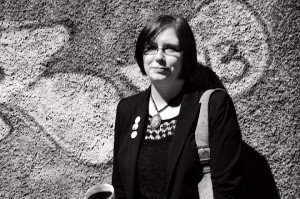
For anyone that hasn’t read them can you tell us a bit about your books
THE COPPER PROMISE, and its sequel, THE IRON GHOST, are epic fantasy books with a strong leaning towards sword and sorcery: there’s definitely a world-threatening disaster looming here, but my sellsword characters aren’t sure they’re being paid enough to deal with it.
The blurb for THE COPPER PROMISE
There are some tall stories about the caverns beneath the Citadel - about magic and mages and monsters and gods.
Wydrin of Crosshaven has heard them all, but she's spent long enough trawling caverns and taverns with her companion Sir Sebastian to learn that there's no money to be made in chasing rumours. But then a crippled nobleman with a dead man's name offers them a job: exploring the Citadel's darkest depths. It sounds like just another quest with gold and adventure ... if they're lucky, they might even have a tale of their own to tell once it's over.
These reckless adventurers will soon learn that sometimes there is truth in rumour. Sometimes a story can save your life.
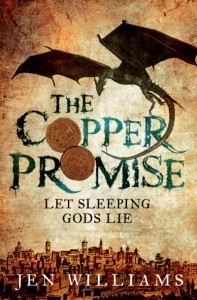
Tell us a bit more about the last book you wrote
The last book I wrote was THE IRON GHOST, which follows on from the end of THE COPPER PROMISE, so without getting into spoilers, expect more adventure, mayhem, and angry gods.
The blurb for THE IRON GHOST
Beware the dawning of a new mage...
Wydrin of Crosshaven, Sir Sebastian and Lord Aaron Frith are experienced in the perils of stirring up the old gods. They are also familiar with defeating them, and the heroes of Baneswatch are now enjoying the perks of suddenly being very much in demand for their services.
When a job comes up in the distant city of Skaldshollow, it looks like easy coin - retrieve a stolen item, admire the views, get paid. But in a place twisted and haunted by ancient magic, with the most infamous mage of them all, Joah Demonsworn, making a reappearance, our heroes soon find themselves threatened by enemies on all sides, old and new. And in the frozen mountains, the stones are walking...
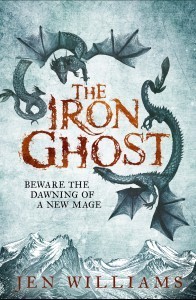 What did you learn about writing whilst writing the last book you wrote?
What did you learn about writing whilst writing the last book you wrote?
Writing THE IRON GHOST was a new experience. Books I’d written previously, including THE COPPER PROMISE, were written to my own schedule in the cosy assumption that I’d probably be the only person to ever read them. Now, I was writing to a deadline for a real publisher, with a contract and everything. Suddenly the whole process was a lot scarier, and a lot more pressurised. “Ye gods,” I thought to myself, “people will actually read this. People will be paying money for it.” There followed a short period of panic and stress-eating, where I threw out notes repeatedly and started the book from scratch twice. Thankfully I got over that reasonably quickly and threw myself back in. I think every book is a learning experience, and perhaps the first one you write entirely under contract is a learning experience in a very specific way – I learnt that you have to be brave, and you can’t be afraid of the blank page.
Do you have a set writing process, if so what is it?
When I write a book I use a mixture of plotting and “making it up as you go along”. So usually I will start with characters – all of my books are very character driven – and I will make lots of notes on who they are and what makes them tick. Then I will get my corkboard out and start pinning up different odds and ends: what do I want to see in this book? What relationships will change and move forward? What sort of monsters/what sort of magic? The story emerges out of that, and once I have the basic framework I will refine it a few times, usually getting the whole thing down to a handful of notecards, and then we’re off. I don’t like to have everything set in stone at that stage, because I want the freedom to be able to follow where the book takes me as the story evolves.
The actual physical writing tends to happen in the evening, after work, or in big chunks at the weekend. I try to have my head in the book at least once a day, every day.
Do you write a lot of short stories?
The truthful answer to this is that I used to! These days I don’t have as much time, but a few years ago I went through a period of writing lots of short stories – mainly horror or dark fantasy. I was the editor of Dark Fiction Magazine for a while too, and was pleased to give a few great short stories an audio home.
Do you prefer the long or short form? How do you feel about Flash Fiction?
I think a well-written short story is a particularly delicious treat, and writing them well requires a special kind of discipline and skill. I suspect that these days my heart belongs to the novel, but one of the proudest moments in my writing career was seeing my flash fiction short THE PRICE published in Black Static magazine.
Which character in your books do you most identify with and why?
Ah, this is tough. I see tiny bits of myself in all three of my main characters; Wydrin and I share a sense of humour and a fear of responsibility, while Sebastian’s somewhat unyielding moral core is something I identify with strongly (when all my school friends were skipping train fares, I was the one who insisted on buying a ticket). I also have a bad temper, so writing Lord Frith’s angrier moments are a lot of fun.
Which bit of your writing are you most proud of?
To be honest, I’m proud to have a book out there at all – it always felt like such a wild dream, and it’s still difficult to comprehend that THE COPPER PROMISE is out in the world, in bookshops and in reader’s hands. In terms of specific writing, there is a subplot in the first book that started off as a throwaway idea and became something very important to the series as a whole. The big bad Dragon god Y’Ruen has an army of dragon-daughters, a bunch of minions to do her dirty work on the ground while she deals death and destruction elsewhere. It was when I started to ask myself questions about these minions – are they inherently evil? What would happen if something caused them to start acting like individuals? – that a big portion of the series’ soul was revealed to me. I’m quite proud of how that turned out.
Tell us a bit about how you got published? Did you go via a slush pile? Get an agent before a publisher?
My path to being published was a little odd, I suppose. Originally I wrote a short novella called THE COPPER PROMISE: GHOSTS OF THE CITADEL, which I self-published as a bit of an experiment. It had some favourable feedback, and a few people asked to see the complete manuscript. In the end, GHOSTS OF THE CITADEL became the opening section of a much larger book, and luckily for me the wonderful agent (and karaoke demon) Julie Mushens signed me up. Shortly after that the book was picked up by Headline, and I spent the next couple of months in shock.
In one sentence what is your best piece of advice for new writers?
Don’t listen too closely to writing advice.
------------------------
Many Thanks to Jen for providing interesting answers to our Bristol Book Blog questions!
Published on October 11, 2014 01:56
October 10, 2014
DJ Donaldson interview
D.J. (Don) Donaldson is a retired medical school professor. Born and raised in Ohio, he obtained a Ph.D. in human anatomy at Tulane, then spent his entire academic career at the University of Tennessee Health Science Center in Memphis. In addition to being the author of several dozen scientific articles on wound healing, he has written seven forensic mysteries and five medical thrillers.
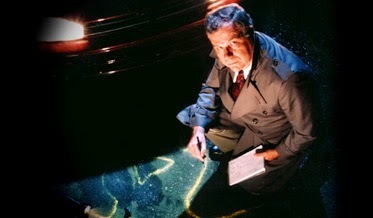
What inspired you to start writing, and when?
Oddly, the thought that I wanted to become a novelist just popped into my head one day shortly after my fiftieth birthday. Part of this sudden desire was a bit of boredom with my real job. I was an anatomy professor at the U. of Tennessee and had accomplished all my major professional goals: course director, funded NIH grant, teaching awards, and many published papers on wound healing. So I guess I needed a new challenge. And boy did I pick a tough one.
I wondered, how does a novice like me learn to write fiction? Taking a few writing courses is an obvious answer. But I had the vague feeling that there were a lot of unpublished writers teaching those courses and I worried that all I’d learn was how to fail. I’m not saying this was the best way, but I decided to just teach myself. I bought ten bestselling novels and tried to figure out what made each of them work. What tricks were the authors using to hold my attention? What made these books so popular? In a sense then, maybe I didn’t teach myself. Maybe Steven King, Robin Cook, Pat Conroy, Michael Palmer, Larry McMurtry, and James Michener did. In any event, eight years later, I sold my first book. So, it took me about as long to become a published novelist as it did to train for medical research and teaching.
Is there anything you find particularly challenging in your writing?
There’s nothing easy about any of it. But titles are a particular challenge. I often can’t figure out what the title of a book should be. Oh, I know when a title is great and so do you… It’s like the dealer at a flea market who once said to me when I picked up an expensive item to look at more closely…”You have good taste.” Then, while I was secretly preening at his compliment, he added, “Of course, it’s not that hard to spot quality.” It’s the same with book titles. Here’s a test: What do you think of this title? They don’t build statues to businessmen.
To me, it’s awful. I’d think so even if I’d been the one to come up with it. Actually, it was the famous writer, Jacqueline Susann, who crafted that one for a book that eventually became a mega best seller as Valley of the dolls. Could there be anybody who likes the first title better? Okay…. there’s always someone who enjoys being a contrarian. But that still doesn’t make the first title any good.
Let’s try another. How about All’s well that ends well? That’s actually not horrible. But it doesn’t sound like the sweeping saga the author wrote. I certainly think the title it was eventually given, War and Peace, is far better.
So, it’s easy to know a great title when you see it, but boy is it hard to come up with one, especially when you’re writing a New Orleans series that needs to have a title that reflects the locale. I usually sit for hours playing with words and rearranging them in what I hope are creative ways. No matter what title I eventually settle on for a book, I have this nagging suspicion that even if I really like the one I pick, there was a much better one I could have used. I just couldn’t find it. My War and Peace was out there, just beyond reach.
Of all my New Orleans books, I’m the most satisfied with the title for Louisiana Fever. Although the title doesn’t specifically mention New Orleans, it lets readers know a lot about the locale. It also strongly suggests that the story involves some kind of contagious disease. The fever part of the title actually refers to Crimean-Congo haemorrhagic fever, a bleeding disease similar to Ebola. Most writers would be thrilled to have written a book that could be related to unfolding world events. Normally, I’d be among them. But in this case, I’d much prefer that there be no reason for Ebola to be in the news every day. I hope this threat is contained soon.
For anyone that hasn’t read them can you tell us a bit about your books
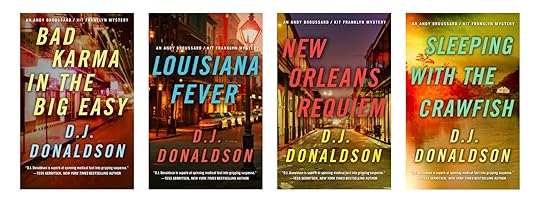
My first book was a mystery. As a beginning writer, that seemed like the best genre for me because mysteries have a classic structure that guides the behaviour and direction of the main characters. In a very general way that structure provides those characters with goals and motivation: Goal: find the killer. Motivation: It’s their job. The genre also provides a structure for conflict: The killer doesn’t want to be found, so he will try to thwart the investigation. I had no idea that my first book would lead to six more with the same characters.After six series mysteries I took a break to try my hand at writing stand-alone thrillers. (Stand-alones have a different cast of characters in each book.) Someone once asked me what the difference is between a mystery and a thriller. There can be a lot of overlap in the two, but generally thrillers put the main character in danger throughout the book. In mysteries, the danger often arises only when the protagonist begins to close in on the killer.I have to say I like series and stand alones equally well. If you look at my list of published novels (seven forensic mysteries and five medical thrillers), it’s obvious that I’ve drawn on my academic background to write both kinds of books. They say to “write what you know”, and I have. Except that for every book, It’s taken about six months of intensive research to learn a lot of necessary material, both scientific and otherwise, that I didn’t know when I started the book. That research has been a lot of fun. For one book, I spent a week in Madison Wisconsin, visiting dairy farms ... even had a milk cow poop on my shoes. (Okay, I didn’t like that part much.)
What are you working on now (apart from this interview of course)?
I’ve always wanted my books to be available on audio. I’m excited to tell you that my entire New Orleans forensic mystery series is now in production with Audible books. I haven’t yet heard any of it, so I’m really looking forward to listening to what they’ve done. The narrator is Brian Troxell, who has narrated about 75 other books for Audible. I’ve listened to some of those and I think he’s going to do a great job. When he asked me for some hints about how to portray Broussard, the greatly overweight New Orleans medical examiner, I told him to think of the character actor, Wilfred Brimley. From the moment I wrote the first words about Broussard I pictured him being played in film by Brimley. In one sentence what is your best piece of advice for new writers?Write because you love it. Don’t write for wealth or fame because most writers in the world, even those who have sold books to major publishers, can’t claim either of those status symbols. There’s an old quote that says, “You can get rich in this country by being a writer, but you can’t make a living.” If you don’t love doing it then you can be crushed by the difficulties inherent in the pursuit.

What inspired you to start writing, and when?
Oddly, the thought that I wanted to become a novelist just popped into my head one day shortly after my fiftieth birthday. Part of this sudden desire was a bit of boredom with my real job. I was an anatomy professor at the U. of Tennessee and had accomplished all my major professional goals: course director, funded NIH grant, teaching awards, and many published papers on wound healing. So I guess I needed a new challenge. And boy did I pick a tough one.
I wondered, how does a novice like me learn to write fiction? Taking a few writing courses is an obvious answer. But I had the vague feeling that there were a lot of unpublished writers teaching those courses and I worried that all I’d learn was how to fail. I’m not saying this was the best way, but I decided to just teach myself. I bought ten bestselling novels and tried to figure out what made each of them work. What tricks were the authors using to hold my attention? What made these books so popular? In a sense then, maybe I didn’t teach myself. Maybe Steven King, Robin Cook, Pat Conroy, Michael Palmer, Larry McMurtry, and James Michener did. In any event, eight years later, I sold my first book. So, it took me about as long to become a published novelist as it did to train for medical research and teaching.
Is there anything you find particularly challenging in your writing?
There’s nothing easy about any of it. But titles are a particular challenge. I often can’t figure out what the title of a book should be. Oh, I know when a title is great and so do you… It’s like the dealer at a flea market who once said to me when I picked up an expensive item to look at more closely…”You have good taste.” Then, while I was secretly preening at his compliment, he added, “Of course, it’s not that hard to spot quality.” It’s the same with book titles. Here’s a test: What do you think of this title? They don’t build statues to businessmen.
To me, it’s awful. I’d think so even if I’d been the one to come up with it. Actually, it was the famous writer, Jacqueline Susann, who crafted that one for a book that eventually became a mega best seller as Valley of the dolls. Could there be anybody who likes the first title better? Okay…. there’s always someone who enjoys being a contrarian. But that still doesn’t make the first title any good.
Let’s try another. How about All’s well that ends well? That’s actually not horrible. But it doesn’t sound like the sweeping saga the author wrote. I certainly think the title it was eventually given, War and Peace, is far better.
So, it’s easy to know a great title when you see it, but boy is it hard to come up with one, especially when you’re writing a New Orleans series that needs to have a title that reflects the locale. I usually sit for hours playing with words and rearranging them in what I hope are creative ways. No matter what title I eventually settle on for a book, I have this nagging suspicion that even if I really like the one I pick, there was a much better one I could have used. I just couldn’t find it. My War and Peace was out there, just beyond reach.
Of all my New Orleans books, I’m the most satisfied with the title for Louisiana Fever. Although the title doesn’t specifically mention New Orleans, it lets readers know a lot about the locale. It also strongly suggests that the story involves some kind of contagious disease. The fever part of the title actually refers to Crimean-Congo haemorrhagic fever, a bleeding disease similar to Ebola. Most writers would be thrilled to have written a book that could be related to unfolding world events. Normally, I’d be among them. But in this case, I’d much prefer that there be no reason for Ebola to be in the news every day. I hope this threat is contained soon.
For anyone that hasn’t read them can you tell us a bit about your books

My first book was a mystery. As a beginning writer, that seemed like the best genre for me because mysteries have a classic structure that guides the behaviour and direction of the main characters. In a very general way that structure provides those characters with goals and motivation: Goal: find the killer. Motivation: It’s their job. The genre also provides a structure for conflict: The killer doesn’t want to be found, so he will try to thwart the investigation. I had no idea that my first book would lead to six more with the same characters.After six series mysteries I took a break to try my hand at writing stand-alone thrillers. (Stand-alones have a different cast of characters in each book.) Someone once asked me what the difference is between a mystery and a thriller. There can be a lot of overlap in the two, but generally thrillers put the main character in danger throughout the book. In mysteries, the danger often arises only when the protagonist begins to close in on the killer.I have to say I like series and stand alones equally well. If you look at my list of published novels (seven forensic mysteries and five medical thrillers), it’s obvious that I’ve drawn on my academic background to write both kinds of books. They say to “write what you know”, and I have. Except that for every book, It’s taken about six months of intensive research to learn a lot of necessary material, both scientific and otherwise, that I didn’t know when I started the book. That research has been a lot of fun. For one book, I spent a week in Madison Wisconsin, visiting dairy farms ... even had a milk cow poop on my shoes. (Okay, I didn’t like that part much.)
What are you working on now (apart from this interview of course)?
I’ve always wanted my books to be available on audio. I’m excited to tell you that my entire New Orleans forensic mystery series is now in production with Audible books. I haven’t yet heard any of it, so I’m really looking forward to listening to what they’ve done. The narrator is Brian Troxell, who has narrated about 75 other books for Audible. I’ve listened to some of those and I think he’s going to do a great job. When he asked me for some hints about how to portray Broussard, the greatly overweight New Orleans medical examiner, I told him to think of the character actor, Wilfred Brimley. From the moment I wrote the first words about Broussard I pictured him being played in film by Brimley. In one sentence what is your best piece of advice for new writers?Write because you love it. Don’t write for wealth or fame because most writers in the world, even those who have sold books to major publishers, can’t claim either of those status symbols. There’s an old quote that says, “You can get rich in this country by being a writer, but you can’t make a living.” If you don’t love doing it then you can be crushed by the difficulties inherent in the pursuit.
Published on October 10, 2014 00:33
October 9, 2014
Laure Eve Interview
Today Laure Eve dropped by to discuss her writing

Laure Eve is a French-British hybrid who grew up in Cornwall, a place saturated with myth and fantasy. She speaks English and French, and can hold a vague conversation, usually about food, in Greek.
A few things she loves: Haagen Dazs cookie dough ice cream, Jean Claude van Damme, David Lynch, pretty much any version of Dracula ever. Also books, cake, films and shoes.
I asked Laure a whole bunch of Bristol Book Blog questions
For anyone that hasn’t read them can you tell us a bit about your books
Fearsome Dreamer and The Illusionists are a ridiculously hard to explain mash up duology of sci-fi, fantasy and a bit of horror. Reviewers have mentioned that they’re kind of like reading The Matrix and Trudi Canavan’s The Black Magician trilogy via Pride and Prejudice. This is probably quite accurate.
Tell us a bit more about the last book you wrote
I’m about to finish the first draft of a book with a working title of The Graces. It’s kind of like a British version of the film The Craft, with a slightly ickier kind of underbelly feel to it and a main character who walks an extremely fine line between antihero and villain. It’s an exploration of what it would really be like to have magic, i.e. less of the awesome and more of the awful.
What did you learn about writing whilst writing the last book you wrote?
I learned that it’s different every single time and never too rely on a single way of doing things. Your process changes with each book, and you just have to be able to roll with that.
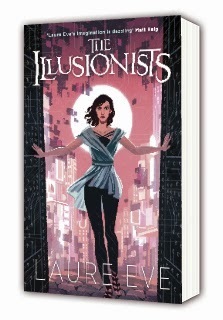 Do you have a set writing process, if so what is it?
Do you have a set writing process, if so what is it?
See above :) The only set thing about it is that I have a busy full time job, so I have to grab writing time when I can. That invariably means I write on my daily commute and most evenings/weekends. But in terms of structure or process, no - every time I write it happens in a different way.
Do you write a lot of short stories?
I have written a couple, but actually only on commission. I tend to gravitate to longer fiction for some reason. But I do keep getting asked for them, and as long as the ideas keep coming I’ll keep writing them.
Do you prefer the long or short form? How do you feel about Flash Fiction?
Short form is hard. Not necessarily harder than long, just hard in a different way. There’s no time to set anything up - you have to get to the meat and bone of a story and I think you have to satisfy in a way you may not need to in longer fiction, which sometimes can give the reader satisfaction enough in the journey you’ve taken them on.I have to say I’ve not written a lot of flash fiction. I admire it when it’s done well but it’s not something I feel like I could try my hand at.
Which character in your books do you most identify with and why?
This is an annoying answer, but I identify with them all. They each have bits of me, concerns and passions of mine, ways of seeing and processing the world, that resonate. Rue’s preoccupation with the truth and intense dislike of people who lie; Wren’s overriding need to prove himself and not die without having made his mark on the world; White’s blunt awkwardness, fear of openness and being weak; Frith’s distrust of everyone and everything :) I paint such a pretty picture of myself.
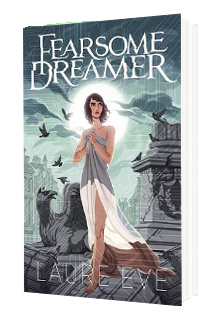
Which bit of your writing are you most proud of?
Every time I get to the end of a story. That’s the bit I’m most proud of. That I actually finished it.
Tell us a bit about how you got published? Did you go via a slush pile? Get an agent before a publisher?
I actually wrote a post on this handily entitled ‘My path to getting a book deal’ (link here: http://www.laureeve.co.uk/2012/03/my-path-to-getting-book-deal-or-frick-i.html) which lays it all out in more detail, but basically, yes - I slush piled my way to a fabulous agent (having been rejected previously and make some rookie errors along the way) and was lucky enough to get a deal through him with the amazing Hot Key Books fairly quickly.
In one sentence what is your best piece of advice for new writers?
Read, read, read; write, write, write. Less glibly - I think writing is something you can only learn how to do by doing it. And if you don’t read a lot, you’ll have no idea what makes a good story, and what doesn’t. So read a lot, and widely. Then write, as much as possible, and keep doing it until you’ve made great stories of your own.
--------------------------
Many thanks to Laure for her interesting answers - go check out her books!

Laure Eve is a French-British hybrid who grew up in Cornwall, a place saturated with myth and fantasy. She speaks English and French, and can hold a vague conversation, usually about food, in Greek.
A few things she loves: Haagen Dazs cookie dough ice cream, Jean Claude van Damme, David Lynch, pretty much any version of Dracula ever. Also books, cake, films and shoes.
I asked Laure a whole bunch of Bristol Book Blog questions
For anyone that hasn’t read them can you tell us a bit about your books
Fearsome Dreamer and The Illusionists are a ridiculously hard to explain mash up duology of sci-fi, fantasy and a bit of horror. Reviewers have mentioned that they’re kind of like reading The Matrix and Trudi Canavan’s The Black Magician trilogy via Pride and Prejudice. This is probably quite accurate.
Tell us a bit more about the last book you wrote
I’m about to finish the first draft of a book with a working title of The Graces. It’s kind of like a British version of the film The Craft, with a slightly ickier kind of underbelly feel to it and a main character who walks an extremely fine line between antihero and villain. It’s an exploration of what it would really be like to have magic, i.e. less of the awesome and more of the awful.
What did you learn about writing whilst writing the last book you wrote?
I learned that it’s different every single time and never too rely on a single way of doing things. Your process changes with each book, and you just have to be able to roll with that.
 Do you have a set writing process, if so what is it?
Do you have a set writing process, if so what is it? See above :) The only set thing about it is that I have a busy full time job, so I have to grab writing time when I can. That invariably means I write on my daily commute and most evenings/weekends. But in terms of structure or process, no - every time I write it happens in a different way.
Do you write a lot of short stories?
I have written a couple, but actually only on commission. I tend to gravitate to longer fiction for some reason. But I do keep getting asked for them, and as long as the ideas keep coming I’ll keep writing them.
Do you prefer the long or short form? How do you feel about Flash Fiction?
Short form is hard. Not necessarily harder than long, just hard in a different way. There’s no time to set anything up - you have to get to the meat and bone of a story and I think you have to satisfy in a way you may not need to in longer fiction, which sometimes can give the reader satisfaction enough in the journey you’ve taken them on.I have to say I’ve not written a lot of flash fiction. I admire it when it’s done well but it’s not something I feel like I could try my hand at.
Which character in your books do you most identify with and why?
This is an annoying answer, but I identify with them all. They each have bits of me, concerns and passions of mine, ways of seeing and processing the world, that resonate. Rue’s preoccupation with the truth and intense dislike of people who lie; Wren’s overriding need to prove himself and not die without having made his mark on the world; White’s blunt awkwardness, fear of openness and being weak; Frith’s distrust of everyone and everything :) I paint such a pretty picture of myself.

Which bit of your writing are you most proud of?
Every time I get to the end of a story. That’s the bit I’m most proud of. That I actually finished it.
Tell us a bit about how you got published? Did you go via a slush pile? Get an agent before a publisher?
I actually wrote a post on this handily entitled ‘My path to getting a book deal’ (link here: http://www.laureeve.co.uk/2012/03/my-path-to-getting-book-deal-or-frick-i.html) which lays it all out in more detail, but basically, yes - I slush piled my way to a fabulous agent (having been rejected previously and make some rookie errors along the way) and was lucky enough to get a deal through him with the amazing Hot Key Books fairly quickly.
In one sentence what is your best piece of advice for new writers?
Read, read, read; write, write, write. Less glibly - I think writing is something you can only learn how to do by doing it. And if you don’t read a lot, you’ll have no idea what makes a good story, and what doesn’t. So read a lot, and widely. Then write, as much as possible, and keep doing it until you’ve made great stories of your own.
--------------------------
Many thanks to Laure for her interesting answers - go check out her books!
Published on October 09, 2014 00:53
October 8, 2014
Alistair Rennie interview
Today Alistair Rennie has dropped by the blog to talk about his writing & other topics.
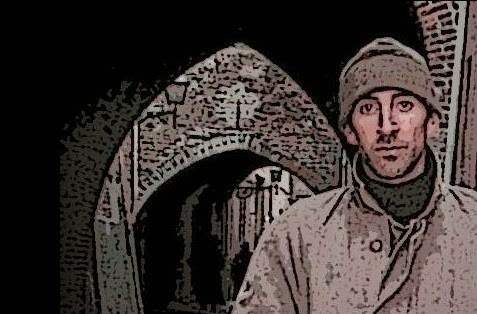 Alistair Rennie was born in the North of Scotland, lived for ten years in Italy, and now lives in the South of Scotland in Edinburgh. He holds a first class Honours Degree in Literature from the University of Aberdeen and a PhD in Literature from the University of Edinburgh.
Alistair Rennie was born in the North of Scotland, lived for ten years in Italy, and now lives in the South of Scotland in Edinburgh. He holds a first class Honours Degree in Literature from the University of Aberdeen and a PhD in Literature from the University of Edinburgh.
Rennie has published fantasy and horror fiction, essays and poetry in The New Weird anthology, Weird Tales magazine, Fabulous Whitby, Electric Velocipede, Mythic Delirium, Pevnost, Schlock Magazine, Horror Without Victims, Weird Fiction Review and Shadowed Realms.
Alistair can be found at : http://alistairrennie.com/
I asked Alistair a whole bunch of usual Bristol Book Blog questions -
What are you working on at the moment (apart from this interview)
I’m working on a novel which I intend to be fairly short called Dreadful Nights. It takes its name from a 19th narrative poem called The City of Dreadful Night by James Thomson.It’s a horror novel about the activities of these sentient beasts of which there are two types, namely Goat Things and Shame Seekers. I don’t know what they are, to be honest. They’re sort of nature demons or emissaries of cosmic disorder – possibly of some esoteric religious significance. I won’t know what they are for a long time yet, because that would spoil the fun of writing the story for me.But you'll be glad to know that, for good solid misanthropic reasons, these beasties are driven by a desire to destroy humanity by the most painful means and methods possible. The problem is, they are far too few in number to ever come close to achieving this. Hence my strapline: destroying the world, one human at a time…
Do you have a set writing process, if so what is it?
I'm quite strict about the fact that I don't follow any kind of technical or number-crunching process. The element of spontaneity is paramount for me, to the point that I rarely plan ahead with anything, and certainly not in any detail. For me, it's a case of letting ideas trigger other ideas that crystallize into something greater. The important thing is also to ensure that you back up any momentum you have with effort.
You lived for ten years in Italy – who are the Italian authors we should all be reading (but don’t)?
My favourite Italian writer is actually a poet of the early 19th Century called Leopardi, a household name in Italy but not so well-known in English-speaking countries. Funnily enough, James Thomson mentioned above was one of the first people to translate Leopardi into English. They both share a bleak outlook, to put it mildly.
Valerio Evangelisti would be the one of interest to genre fans. He's a very interesting writer. And I know that Italian crime fiction is very strong right now, spearheaded by Camilleri but with quite a few others picking up the mantle. So if you like crime fiction, Italy is waiting for you.
I first came across your work in The New Weird There has been some debate over what the term means, would you describe your work as New Weird & what do you think it means?
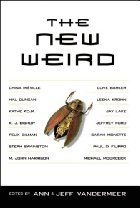
I see New Weird simply as a mode of fiction that takes disparate elements of fantasy, horror, SF and crime fiction and fuses them together in one setting. Such things have been done before, but not with the same overtness or carnivalesque disregard for the rules.
But what I think is most important about New Weird, what it does best, is that it fuses literary and pulp styles until they're no longer distinguishable, doing this partly as an effort towards obliterating class structures within fiction, as it were. New Weird is deliberately perverse, but not for the sake of perversion alone.
I certainly wouldn't describe my own work as New Weird but neither would I resist the term if it was applied to me. I like what it stands for, but I don't aspire to write New Weird. From my own perspective, I've always written fantasy or horror or a mixture of both. As a matter of fact, my story in The New Weirdanthology is, to my mind, a derivation or variation of Sword and Sorcery, what I called Sword and Debauchery. What I wanted to do was replace the sorcery with metaphysics and add excessive amounts of sex and violence that took the story to over-saturation point and beyond.
You take part in a round robin story with, among others, Brian Evenson – can you tell us a bit about that & the experience of working collaboratively
This came by way of invitation by young innovator Rand Burgess. He organised everything and made it very straightforward for us. He basically got Brian to write the first part which was then passed on to me. I wrote the second part, then passed it on to Ann K. Schwader, and so on it went.
There was no contact between the authors. All we had to go by was what came to us from the preceding author, with Brian Evenson kicking things off as only he can.
It was actually a very invigorating experience. There was a feeling, for me, of not wanting to let the team down and to make a contribution that linked well with the preceding scene and provided enough threads for the following author to latch onto and exploit fully, which certainly happened in my case.
You are working on a project entitled - Native Scottish Clouds – A Manifesto for the Necessity of Observing Atmospheric Vapours, the Whys and Wherefores, and the Urgency of Considering Lightfall - can you expand a little on this – what’s it all about?
My masterpiece in the making! This is a work in progress which, I think, will be of very little interest to anyone, unless they share my obsessions with certain meteorological phenomena. This is a development of something I used to do when I was a teenager to try and improve my writing skills and use of language. I kept a journal, called "Weather Report", and what I did was write an entry every day describing the day's weather. I wouldn't write it in a scientific or literally descriptive way. I would write it in a way that would describe the weather in figurative or emotionally charged terms, trying to write it in a literary fashion, I suppose you could say.
It was really an attempt to engage the world - the natural world - in the same way that poetry does. To give a visionary account of the world's terrors and splendours as they occur on a day to day basis, often without us even noticing. I don't think Native Scottish Clouds will ever become a complete work - certainly not one that people would want to read. I think it remains a kind of aspiration that I'll never fulfil. The more I pursue it, the further away it will move from me. But it provides me with practice, which is something that writing requires as matter of course.
You also produce music, can you tell us a bit about that? Are music and fiction, as well as poetry, fundamentally interconnected in your life?
Yes, totally interconnected. Amalgamated, really. Much of my writing has consisted of song lyrics, and still does. I've always been involved in music, playing in 4/5 piece bands when I was younger, as a drummer then a guitarist. But what has endured, since I was very young, is a collaboration with one of my oldest and best friends which has now started to rising to the surface as something more visible - namely, Mongaliech .
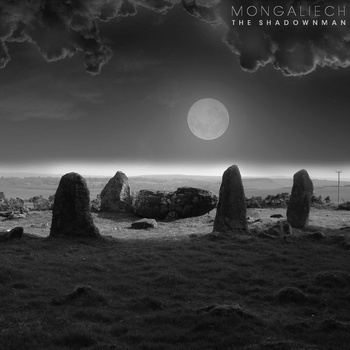

Mongaliech itself is a sort of semi-fictional rendering of the part of the world we grew up in (around the foothills of the Cairngorms). Mongaliech is populated by a variety of characters of savage inclination who are representative of the natural settings. We've built a personal mythology around this over time which, for us, has become very real - and the music is an extension of this.
Do you prefer the long or short form? How do you feel about Flash Fiction?
I like all forms of fiction and can't say I prefer one over the other. I actually, genuinely, don't think about story length when I'm reading. All that matters to me is the story itself and the impact of the words on my relevant thought departments. Novels, I would think, probably tend to engage me more than shorter forms. But there are too many exceptions to the rule to make that stick.
I like flash fiction. Very much so. I think it's a very difficult skill, a very difficult thing to pull off. When it's done well, it's an extremely enjoyable format.
Which bit of your writing are you most proud of?
Pride is not a term I'd use to describe how I feel about anything I've written, to be honest. I think many writers have a feeling of never being satisfied with a piece of work, no matter where it's been published or how successful it's been. The experience of being in The New Weird anthology felt very humbling because of who's in there. The first book I ever bought with my own money was Michael Moorcock's The Quest for Tanelorn, so to find myself alongside him in an anthology was very special for me. But it's humbling more than anything else. In saying that, I was excessively proud of getting a poem published in the legendary Mythic Delirium. I don't know why that was. I think it was simply because poetry is an area of writing where it's extremely difficult to succeed, so I allowed myself an unseemly indulgence for that one.
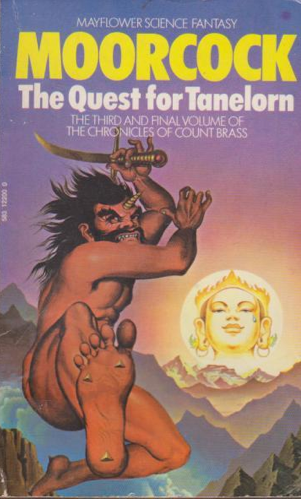
In one sentence what is your best piece of advice for new writers? There are no rules.
 Alistair Rennie was born in the North of Scotland, lived for ten years in Italy, and now lives in the South of Scotland in Edinburgh. He holds a first class Honours Degree in Literature from the University of Aberdeen and a PhD in Literature from the University of Edinburgh.
Alistair Rennie was born in the North of Scotland, lived for ten years in Italy, and now lives in the South of Scotland in Edinburgh. He holds a first class Honours Degree in Literature from the University of Aberdeen and a PhD in Literature from the University of Edinburgh.Rennie has published fantasy and horror fiction, essays and poetry in The New Weird anthology, Weird Tales magazine, Fabulous Whitby, Electric Velocipede, Mythic Delirium, Pevnost, Schlock Magazine, Horror Without Victims, Weird Fiction Review and Shadowed Realms.
Alistair can be found at : http://alistairrennie.com/
I asked Alistair a whole bunch of usual Bristol Book Blog questions -
What are you working on at the moment (apart from this interview)
I’m working on a novel which I intend to be fairly short called Dreadful Nights. It takes its name from a 19th narrative poem called The City of Dreadful Night by James Thomson.It’s a horror novel about the activities of these sentient beasts of which there are two types, namely Goat Things and Shame Seekers. I don’t know what they are, to be honest. They’re sort of nature demons or emissaries of cosmic disorder – possibly of some esoteric religious significance. I won’t know what they are for a long time yet, because that would spoil the fun of writing the story for me.But you'll be glad to know that, for good solid misanthropic reasons, these beasties are driven by a desire to destroy humanity by the most painful means and methods possible. The problem is, they are far too few in number to ever come close to achieving this. Hence my strapline: destroying the world, one human at a time…
Do you have a set writing process, if so what is it?
I'm quite strict about the fact that I don't follow any kind of technical or number-crunching process. The element of spontaneity is paramount for me, to the point that I rarely plan ahead with anything, and certainly not in any detail. For me, it's a case of letting ideas trigger other ideas that crystallize into something greater. The important thing is also to ensure that you back up any momentum you have with effort.
You lived for ten years in Italy – who are the Italian authors we should all be reading (but don’t)?
My favourite Italian writer is actually a poet of the early 19th Century called Leopardi, a household name in Italy but not so well-known in English-speaking countries. Funnily enough, James Thomson mentioned above was one of the first people to translate Leopardi into English. They both share a bleak outlook, to put it mildly.
Valerio Evangelisti would be the one of interest to genre fans. He's a very interesting writer. And I know that Italian crime fiction is very strong right now, spearheaded by Camilleri but with quite a few others picking up the mantle. So if you like crime fiction, Italy is waiting for you.
I first came across your work in The New Weird There has been some debate over what the term means, would you describe your work as New Weird & what do you think it means?

I see New Weird simply as a mode of fiction that takes disparate elements of fantasy, horror, SF and crime fiction and fuses them together in one setting. Such things have been done before, but not with the same overtness or carnivalesque disregard for the rules.
But what I think is most important about New Weird, what it does best, is that it fuses literary and pulp styles until they're no longer distinguishable, doing this partly as an effort towards obliterating class structures within fiction, as it were. New Weird is deliberately perverse, but not for the sake of perversion alone.
I certainly wouldn't describe my own work as New Weird but neither would I resist the term if it was applied to me. I like what it stands for, but I don't aspire to write New Weird. From my own perspective, I've always written fantasy or horror or a mixture of both. As a matter of fact, my story in The New Weirdanthology is, to my mind, a derivation or variation of Sword and Sorcery, what I called Sword and Debauchery. What I wanted to do was replace the sorcery with metaphysics and add excessive amounts of sex and violence that took the story to over-saturation point and beyond.
You take part in a round robin story with, among others, Brian Evenson – can you tell us a bit about that & the experience of working collaboratively
This came by way of invitation by young innovator Rand Burgess. He organised everything and made it very straightforward for us. He basically got Brian to write the first part which was then passed on to me. I wrote the second part, then passed it on to Ann K. Schwader, and so on it went.
There was no contact between the authors. All we had to go by was what came to us from the preceding author, with Brian Evenson kicking things off as only he can.
It was actually a very invigorating experience. There was a feeling, for me, of not wanting to let the team down and to make a contribution that linked well with the preceding scene and provided enough threads for the following author to latch onto and exploit fully, which certainly happened in my case.
You are working on a project entitled - Native Scottish Clouds – A Manifesto for the Necessity of Observing Atmospheric Vapours, the Whys and Wherefores, and the Urgency of Considering Lightfall - can you expand a little on this – what’s it all about?
My masterpiece in the making! This is a work in progress which, I think, will be of very little interest to anyone, unless they share my obsessions with certain meteorological phenomena. This is a development of something I used to do when I was a teenager to try and improve my writing skills and use of language. I kept a journal, called "Weather Report", and what I did was write an entry every day describing the day's weather. I wouldn't write it in a scientific or literally descriptive way. I would write it in a way that would describe the weather in figurative or emotionally charged terms, trying to write it in a literary fashion, I suppose you could say.
It was really an attempt to engage the world - the natural world - in the same way that poetry does. To give a visionary account of the world's terrors and splendours as they occur on a day to day basis, often without us even noticing. I don't think Native Scottish Clouds will ever become a complete work - certainly not one that people would want to read. I think it remains a kind of aspiration that I'll never fulfil. The more I pursue it, the further away it will move from me. But it provides me with practice, which is something that writing requires as matter of course.
You also produce music, can you tell us a bit about that? Are music and fiction, as well as poetry, fundamentally interconnected in your life?
Yes, totally interconnected. Amalgamated, really. Much of my writing has consisted of song lyrics, and still does. I've always been involved in music, playing in 4/5 piece bands when I was younger, as a drummer then a guitarist. But what has endured, since I was very young, is a collaboration with one of my oldest and best friends which has now started to rising to the surface as something more visible - namely, Mongaliech .


Mongaliech itself is a sort of semi-fictional rendering of the part of the world we grew up in (around the foothills of the Cairngorms). Mongaliech is populated by a variety of characters of savage inclination who are representative of the natural settings. We've built a personal mythology around this over time which, for us, has become very real - and the music is an extension of this.
Do you prefer the long or short form? How do you feel about Flash Fiction?
I like all forms of fiction and can't say I prefer one over the other. I actually, genuinely, don't think about story length when I'm reading. All that matters to me is the story itself and the impact of the words on my relevant thought departments. Novels, I would think, probably tend to engage me more than shorter forms. But there are too many exceptions to the rule to make that stick.
I like flash fiction. Very much so. I think it's a very difficult skill, a very difficult thing to pull off. When it's done well, it's an extremely enjoyable format.
Which bit of your writing are you most proud of?
Pride is not a term I'd use to describe how I feel about anything I've written, to be honest. I think many writers have a feeling of never being satisfied with a piece of work, no matter where it's been published or how successful it's been. The experience of being in The New Weird anthology felt very humbling because of who's in there. The first book I ever bought with my own money was Michael Moorcock's The Quest for Tanelorn, so to find myself alongside him in an anthology was very special for me. But it's humbling more than anything else. In saying that, I was excessively proud of getting a poem published in the legendary Mythic Delirium. I don't know why that was. I think it was simply because poetry is an area of writing where it's extremely difficult to succeed, so I allowed myself an unseemly indulgence for that one.

In one sentence what is your best piece of advice for new writers? There are no rules.
Published on October 08, 2014 01:42
October 7, 2014
Sibilant Fricative Review
Sibilant Fricative by Adam Roberts
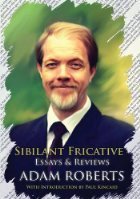
How could a book reviewer resist this collection? Adam Roberts, the author of e.g. Yellow blue tibia (which I reviewed previously) and By light alone also writes reviews, and pulls no punches. In this collection of reviews and essays of SF (Sibilant & Fricative respectively) he casts his eye over a variety of books and films. I confess to reading the reviews completely out of order, going through the ones of books and films I had already seen and some I had reviewed myself. This was to get a “baseline” for the books and films I’ve not yet got to so that I know what Roberts likes and doesn't and where he agrees and disagrees with me so that I can see what I need to add to the TBR & TBW piles.
He reviews PKD, Ballard, Pynchon, Mieville, Bova and many others in the SF section, as well as Star Trek & District 9 films and Tolkein, Le Guin, Rothfuss and notably all of the Wheel of Time in the Fantasy section. He reviews with great insight, sly humour and occasionally in the style of the book he is reviewing. The vast majority of the reviews are very entertaining and some are thought provoking, the best are both. For example Roberts sets himself the task to review The Wheel of Time which starts better than he expected but then rapidly becomes a massive chore. Along the way we get a class on how to write well, and why Jordan doesn't and thoughts about epic fantasy, fandom and a brief meta discussion about reviews. This, in addition to the essay on the “Two Hobbits” is worth the entry ticket alone, and there is so much more entertainment within.
I started keeping note of some of the more out-leap-y examples of WoT-style … But after 120-pages of this I exhausted the patience necessary to interrupt my reading with jotting examples down in my notebook. I wanted to get through the damn thing as soon as possible. That’s not to say that the writing gets any better, for it does not
If you like reading reviews – and you must do if you’re reading this one right? Then I highly recommend this collection to you.
Overall –Erudite, entertaining, intelligent collection of essays and reviews.

How could a book reviewer resist this collection? Adam Roberts, the author of e.g. Yellow blue tibia (which I reviewed previously) and By light alone also writes reviews, and pulls no punches. In this collection of reviews and essays of SF (Sibilant & Fricative respectively) he casts his eye over a variety of books and films. I confess to reading the reviews completely out of order, going through the ones of books and films I had already seen and some I had reviewed myself. This was to get a “baseline” for the books and films I’ve not yet got to so that I know what Roberts likes and doesn't and where he agrees and disagrees with me so that I can see what I need to add to the TBR & TBW piles.
He reviews PKD, Ballard, Pynchon, Mieville, Bova and many others in the SF section, as well as Star Trek & District 9 films and Tolkein, Le Guin, Rothfuss and notably all of the Wheel of Time in the Fantasy section. He reviews with great insight, sly humour and occasionally in the style of the book he is reviewing. The vast majority of the reviews are very entertaining and some are thought provoking, the best are both. For example Roberts sets himself the task to review The Wheel of Time which starts better than he expected but then rapidly becomes a massive chore. Along the way we get a class on how to write well, and why Jordan doesn't and thoughts about epic fantasy, fandom and a brief meta discussion about reviews. This, in addition to the essay on the “Two Hobbits” is worth the entry ticket alone, and there is so much more entertainment within.
I started keeping note of some of the more out-leap-y examples of WoT-style … But after 120-pages of this I exhausted the patience necessary to interrupt my reading with jotting examples down in my notebook. I wanted to get through the damn thing as soon as possible. That’s not to say that the writing gets any better, for it does not
If you like reading reviews – and you must do if you’re reading this one right? Then I highly recommend this collection to you.
Overall –Erudite, entertaining, intelligent collection of essays and reviews.
Published on October 07, 2014 05:40
October 4, 2014
Travel, Identity & Home
On the 7th of November I'll be taking part in a special event in Paintworks Bristol: -
Travel, Identity & Home – a Literary Night Inspired by Art
7th November 20146pm – 7.30pm
This November, renowned international sculptor Carol Peace invites you into her studio for an intimate evening of poetry and prose, co-curated by writer Judy Darley.Seven writers will share literary works inspired by Carol’s work, and by the themes Travel, Identity and Home. The event will explore the way different creative mediums can influence and benefit from one another.
The night will offer the chance to meet Carol, hear the writers and performers, and have a glass of wine amongst beautiful works of art. ”For me this dialogue between words and sculpture started many years ago with a poet’s visit to my open studio. John Terry wrote a few poems including ‘Listen’ that made me look again – the figure had a new story, a new life,” she says. “Sculpture can be like this. Maybe it’s just a suggestion to a thought, a step, a bridge to another story, I have my ideas but the message is often reformed through other eyes.”
With just 30 tickets available, this is a golden opportunity to see what can happen when art and words come together.Featuring the words of Judy Darley, Joanna Butler, Paul Deaton, Helen Moore, Maithreyi Nandakumar, Pete Sutton, John Terry, it promises to be a thought-provoking and uplifting evening.Further Notes:This event is part of Carol Peace’s Open Studio Event 6th - 16th November 2014 Date & Time: Friday 7th November 2014, 6pm - 7.30pm Address: Unit 5.3 Paintworks, Bath Road, Bristol, BS4 3EH. Tickets: Cost £4 (£3 for early bird purchases).Tickets are available to buy from Eventbritehere >>
Other Events: Also taking place at Carol’s Studio, Judy Darley will be leading a workshop on ‘Writing from Art’ on Wednesday 12th November, 2-5pm. Attendance costs £12. More info and to buy tickets here >>
Find out more at www.carolpeace.comand www.SkyLightRain.com.
Travel, Identity & Home – a Literary Night Inspired by Art
7th November 20146pm – 7.30pm
This November, renowned international sculptor Carol Peace invites you into her studio for an intimate evening of poetry and prose, co-curated by writer Judy Darley.Seven writers will share literary works inspired by Carol’s work, and by the themes Travel, Identity and Home. The event will explore the way different creative mediums can influence and benefit from one another.

The night will offer the chance to meet Carol, hear the writers and performers, and have a glass of wine amongst beautiful works of art. ”For me this dialogue between words and sculpture started many years ago with a poet’s visit to my open studio. John Terry wrote a few poems including ‘Listen’ that made me look again – the figure had a new story, a new life,” she says. “Sculpture can be like this. Maybe it’s just a suggestion to a thought, a step, a bridge to another story, I have my ideas but the message is often reformed through other eyes.”
With just 30 tickets available, this is a golden opportunity to see what can happen when art and words come together.Featuring the words of Judy Darley, Joanna Butler, Paul Deaton, Helen Moore, Maithreyi Nandakumar, Pete Sutton, John Terry, it promises to be a thought-provoking and uplifting evening.Further Notes:This event is part of Carol Peace’s Open Studio Event 6th - 16th November 2014 Date & Time: Friday 7th November 2014, 6pm - 7.30pm Address: Unit 5.3 Paintworks, Bath Road, Bristol, BS4 3EH. Tickets: Cost £4 (£3 for early bird purchases).Tickets are available to buy from Eventbritehere >>
Other Events: Also taking place at Carol’s Studio, Judy Darley will be leading a workshop on ‘Writing from Art’ on Wednesday 12th November, 2-5pm. Attendance costs £12. More info and to buy tickets here >>
Find out more at www.carolpeace.comand www.SkyLightRain.com.
Published on October 04, 2014 02:30
October 3, 2014
My BristolCon schedule
The fine folks at BristolCon have put together another fantastic program
You can find me in a variety of places during the day (mostly in the bar if past years are anything to go by):
13:45Writing Historical Fantasy: If you want to write historical fantasy, you need to do a lot of research, and it can seem daunting. Where do you start, and when can you deviate into the realms of alternate history? What do you gain from basing your fantasy story in the real-world past?
with Pete Sutton (Mod), Jon Courtenay Grimwood, Sarah Ash, Jacey Bedford, Mike Shevdon
Modering a guest of honour no less - I'm, well, honoured
:00 – 18:45Writing Non-Human Characters: What are the challenges in writing aliens, robots, fairies and other non-human characters in F&SF? How do you get inside their heads and make them convincing?
with Peter Newman (Mod), Cavan Scott, Pete Sutton, Amanda Kear (Dr Bob), Kim Lakin-Smith18:50 – 18:55Reading: Pete SuttonInteresting to be on the other side of a panel similar to the one I modded at 9 Worlds.
I'll be reading something - er um, best decide what soonish then - possibly a novel extract if I don't loathe it after self-editing all month!
So, apart from the siren call of the bar, there's lots of other stuff I'd like to see and am looking forward to this immensely.
You can find me in a variety of places during the day (mostly in the bar if past years are anything to go by):
13:45Writing Historical Fantasy: If you want to write historical fantasy, you need to do a lot of research, and it can seem daunting. Where do you start, and when can you deviate into the realms of alternate history? What do you gain from basing your fantasy story in the real-world past?
with Pete Sutton (Mod), Jon Courtenay Grimwood, Sarah Ash, Jacey Bedford, Mike Shevdon
Modering a guest of honour no less - I'm, well, honoured
:00 – 18:45Writing Non-Human Characters: What are the challenges in writing aliens, robots, fairies and other non-human characters in F&SF? How do you get inside their heads and make them convincing?
with Peter Newman (Mod), Cavan Scott, Pete Sutton, Amanda Kear (Dr Bob), Kim Lakin-Smith18:50 – 18:55Reading: Pete SuttonInteresting to be on the other side of a panel similar to the one I modded at 9 Worlds.
I'll be reading something - er um, best decide what soonish then - possibly a novel extract if I don't loathe it after self-editing all month!
So, apart from the siren call of the bar, there's lots of other stuff I'd like to see and am looking forward to this immensely.
Published on October 03, 2014 07:46
October 1, 2014
Aegis Rising giveaway
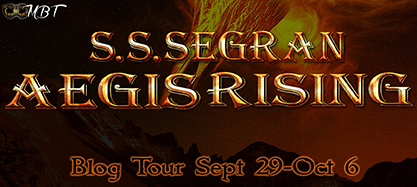
As the three worlds collide, unlikely heroes arise...

Publication Date: November 15, 2013Genre: Action/Adventure, Mystery, Sci-fi
Over a remote northern forest, a small plane carrying five teenage friends flies into a freak storm. Struck by lightning, the aircraft crashes and the passengers find themselves cast into a life-changing adventure.
In a hidden valley, a mysterious people gaze at the stormy sky as a glowing object with fiery wings disappears behind a mountain ridge. The astonishing sight reignites an ancient prophecy foretelling the arrival of five chosen ones destined to become bearers of light against a dark storm gathering on humanity's horizon.
In a distant city, a secretive organization led by a shadowy figure initiates a sequence of cataclysmic events designed to wreak havoc across the planet, beginning with a remote mining site in northern Canada.
As the three worlds collide, unlikely heroes arise. Armed with powers entrusted to them by the ancient prophecy and the resilience of their life-long bond, the five teens take a stand against a malevolent foe.
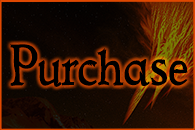
Amazon | Barnes & Noble
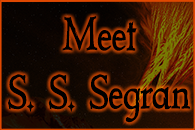
 S.S.Segran is the bestselling author of AEGIS RISING, the first book in the Aegis League Series. In crafting the premise for the novel, she drew from the inspiring imagery of the Pacific Northwest, the intriguing potential of the human mind and above all, her abiding love for adventure, science fiction and mystery stories. She enjoys drawing, horseback riding and is an ardent fan of parkour and freerunning. S.S.Segran is a proud member of the Royal Canadian Air Cadets in British Columbia.
S.S.Segran is the bestselling author of AEGIS RISING, the first book in the Aegis League Series. In crafting the premise for the novel, she drew from the inspiring imagery of the Pacific Northwest, the intriguing potential of the human mind and above all, her abiding love for adventure, science fiction and mystery stories. She enjoys drawing, horseback riding and is an ardent fan of parkour and freerunning. S.S.Segran is a proud member of the Royal Canadian Air Cadets in British Columbia.S.S.Segran is also the founder of Aegis League (www.aegisleague.org), a non-profit organization whose goal is to support youths living in places and conditions that deny them opportunities to grow. The mission of the organization is to provide life-skills training and micro-loan funding to help them launch small businesses in the communities where they reside. Partial proceeds from the sale of her books go to this cause.
Website | Facebook | Twitter | Goodreads | YouTube
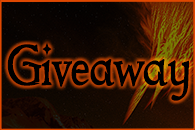
a Rafflecopter giveaway
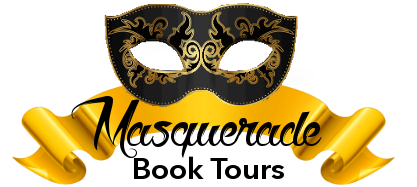
***********
Published on October 01, 2014 00:59
Pete Sutton's Blog
- Pete Sutton's profile
- 14 followers
Pete Sutton isn't a Goodreads Author
(yet),
but they
do have a blog,
so here are some recent posts imported from
their feed.



